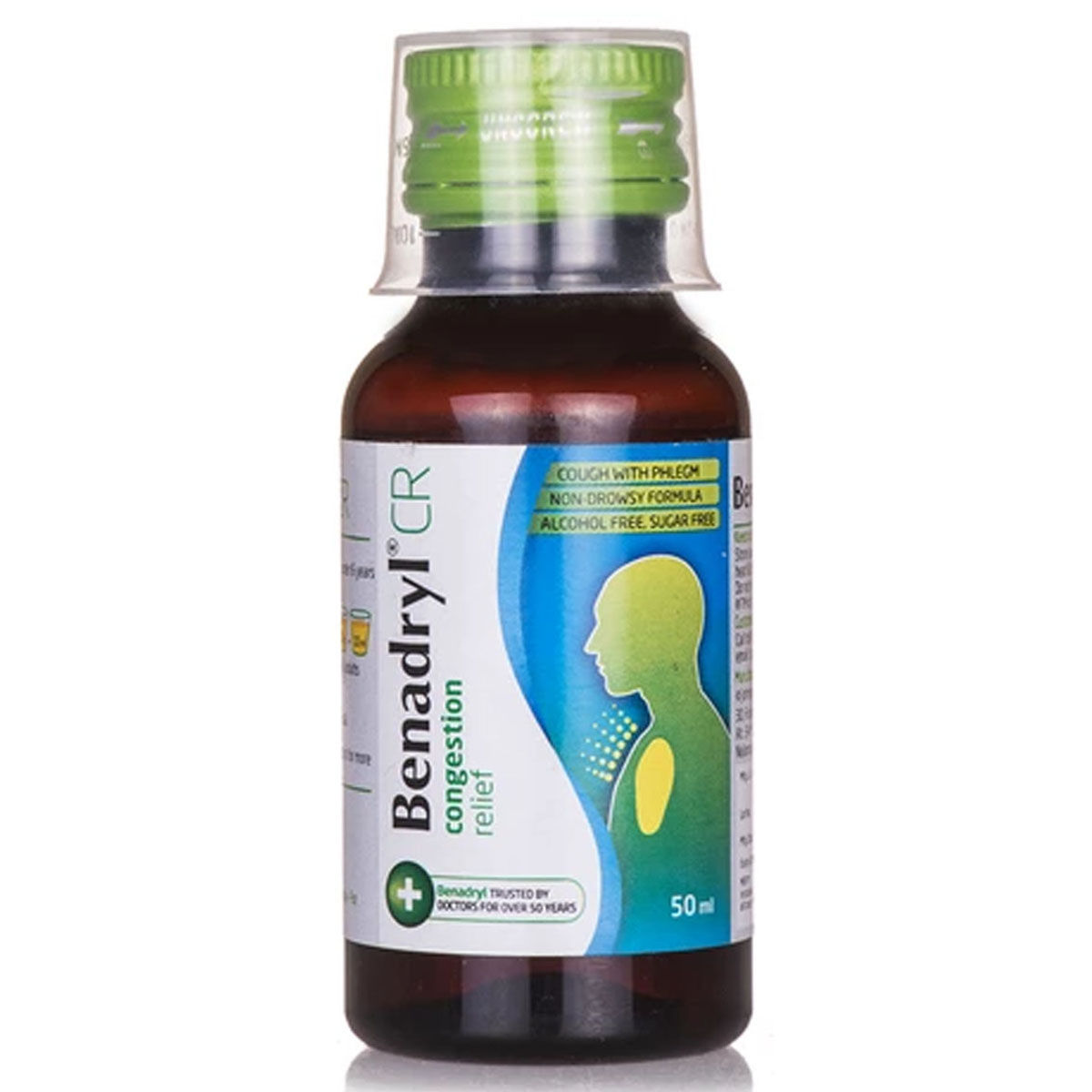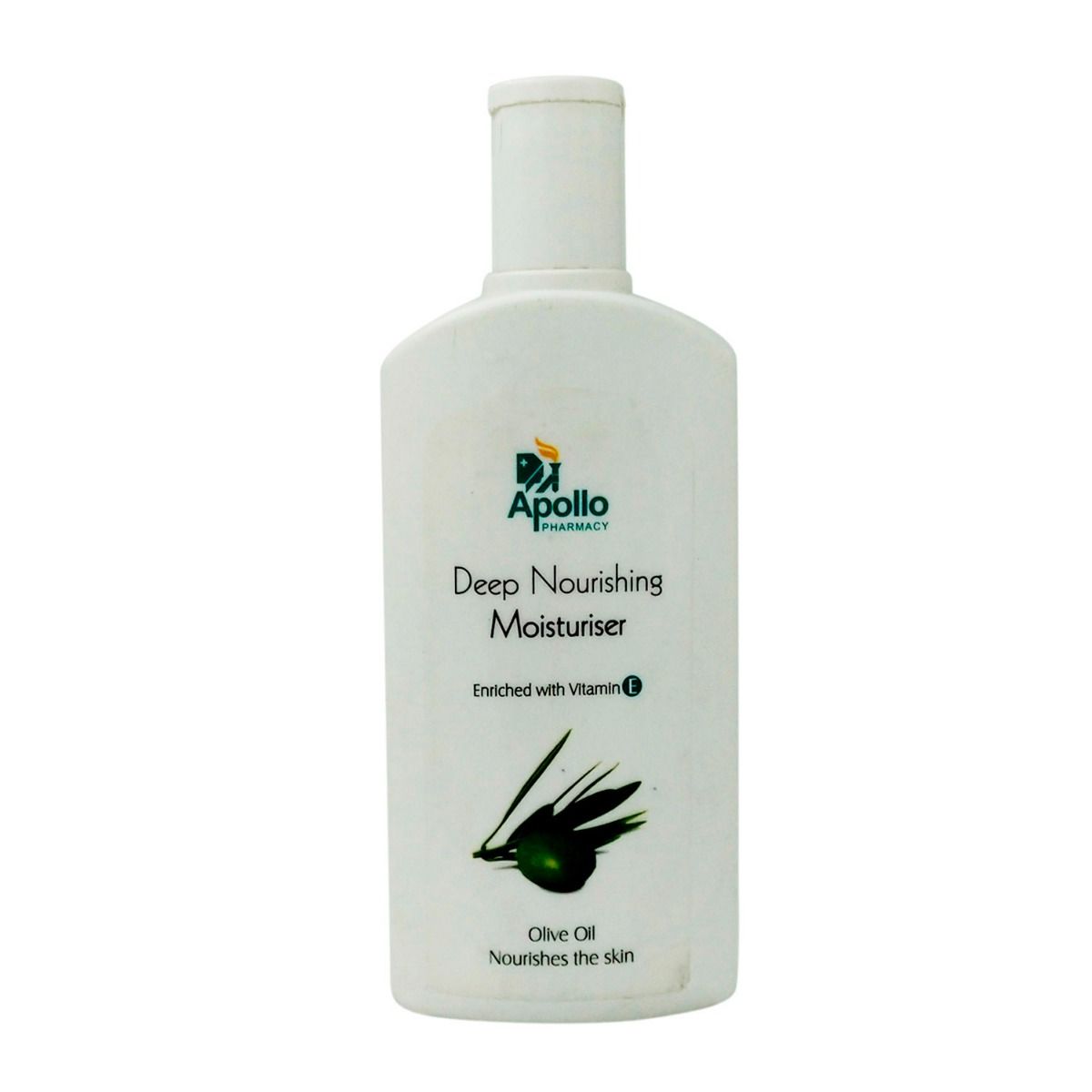Benadryl Congestion Relief Cough Syrup, 50 ml

₹90*
₹87.3*
MRP ₹90
3% CB
₹2.7 cashback(3%)
Free Delivery
With Circle membership
(Inclusive of all Taxes)
Know Your Delivery Time
Provide Delivery Location

Secure Payment

India's Most Trusted Pharmacy

Genuine Products
Composition :
Manufacturer/Marketer :
Return Policy :
Expires on or after :
About Benadryl Congestion Relief Cough Syrup, 50 ml
Benadryl Congestion Relief Cough Syrup, 50 ml belongs to the class of medicines called ‘expectorants’ primarily used to treat cough associated with mucus. Coughing (dry or productive) is a body’s way of clearing irritants (like allergens, mucus, or smoke) from airways and preventing infection. There are two types of coughs, namely: Dry cough and chesty cough. A dry cough is tickly and doesn't produce any vicious or thick mucus, while a chesty cough (wet cough) means mucous or sputum is produced to help clear your airways.
Benadryl Congestion Relief Cough Syrup, 50 ml is a combination of two drugs: Ambroxol (mucolytic agent) and Guaifenesin (expectorant). Ambroxol belongs to the class of mucolytic agents (cough/sputum thinner) that works by thinning and loosening phlegm (mucus) in the lungs, windpipe, and nose. Guaifenesin belongs to the class of expectorants that increase the volume of fluid in the airways, reduce mucus stickiness, and remove it from airways.
Take Benadryl Congestion Relief Cough Syrup, 50 ml with or without food as advised by your doctor with the help of a measuring cup. Your doctor will recommend how often you take Benadryl Congestion Relief Cough Syrup, 50 ml based on your medical condition. Some people may experience nausea, vomiting, drowsiness, headache, dizziness, skin rash, and nervousness. Most of these side effects of Benadryl Congestion Relief Cough Syrup, 50 ml do not require medical attention and gradually resolve over time. However, if the side effects persist or worsen, please consult your doctor.
If you are allergic to Benadryl Congestion Relief Cough Syrup, 50 ml or any other medicines, please tell your doctor. If you are pregnant or breastfeeding, it is advised to inform your doctor before using Benadryl Congestion Relief Cough Syrup, 50 ml. Use Benadryl Congestion Relief Cough Syrup, 50 ml with caution in children if prescribed by a doctor. Drink plenty of fluids while taking Benadryl Congestion Relief Cough Syrup, 50 ml to loosen mucus. It is mandatory to inform your doctor if you have heart, liver, kidney diseases, stomach ulcers, thyroid disorders, diabetes, inflammation of air passages, lung disorders, and difficulty breathing before taking Benadryl Congestion Relief Cough Syrup, 50 ml. Keep your doctor informed about your health condition and medicines to rule out any side-effects.
Uses of Benadryl Congestion Relief Cough Syrup, 50 ml
Key Benefits
Benadryl Congestion Relief Cough Syrup, 50 ml is a combination of two drugs, namely: Ambroxol and Guaifenesin. Ambroxol belongs to the class of mucolytic agents (cough/sputum thinner) that works by thinning and loosening phlegm (mucus) in the lungs, windpipe, and nose for coughing out easily. Being an expectorant, Guaifenesin reduces the thickness or viscosity of bronchial secretions (phlegm) and increases mucus flow making it easier to cough.
Side Effects of Benadryl Congestion Relief Cough Syrup, 50 ml
- Nausea
- Vomiting
- Stomach upset
- Drowsiness
- Dizziness
- Headache
- Skin rash
- Nervousness
Directions for Use
Storage
Drug Warnings
If you are allergic to Benadryl Congestion Relief Cough Syrup, 50 ml or any other medicines, please tell your doctor. If you are pregnant or breastfeeding, it is advised to inform your doctor before using Benadryl Congestion Relief Cough Syrup, 50 ml.If you have diabetes, regular monitoring of blood sugar levels is recommended while taking Benadryl Congestion Relief Cough Syrup, 50 ml. Drink plenty of fluids while taking Benadryl Congestion Relief Cough Syrup, 50 ml to loosen mucus and lubricate your throat. If you cough for a long time, asthma, or suffer from serious asthma attacks, liver or kidney problems, or peptic or duodenal ulcers, inform your doctor before taking Benadryl Congestion Relief Cough Syrup, 50 ml. Ambroxol in Benadryl Congestion Relief Cough Syrup, 50 ml can cause hypokalemia (low potassium levels in the blood). Therefore it should be used with caution in patients with bronchospasm (narrowed airways or bronchi with mucus). Avoid consuming alcohol with Benadryl Congestion Relief Cough Syrup, 50 ml as it could lead to increased drowsiness or dizziness. Drive only if you are alert after taking Benadryl Congestion Relief Cough Syrup, 50 ml as it may cause dizziness or drowsiness in some people.
Therapeutic Class
Drug-Drug Interactions
Drug-Food Interactions
Drug-Drug Interactions Checker List
- ERYTHROMYCIN
- DOXYCYCLINE
- CEFUROXIME
- AMOXICILLIN
Diet & Lifestyle Advise
- Take the medication as directed by the doctor and at regular intervals. Do not use other over-the-counter medications, herbal or vitamin supplements without informing your pharmacist or doctor when you take Benadryl Congestion Relief Cough Syrup, 50 ml.
- Know your triggers like allergens, such as pollen, dust, and food items that make your asthma and other respiratory diseases severe.
- Quit smoking and avoid passive smoking. Smoking also reduces the effectiveness of the medicine.
- Drink warm fluids while you take Benadryl Congestion Relief Cough Syrup, 50 ml to help loosen congestion and lubricate the throat.
- Eat a healthy diet and exercise regularly to strengthen your breathing muscles and boost your immune system.
- Avoid dairy products such as milk as they may increase mucus production. Also, avoid processed or refined foods to have relief from cough. Instead, replace baked foods, fried foods, white bread, white pasta, French fries, sugary desserts, and chips with green leafy vegetables.
- Avoid citrus fruits as they may worsen the cough. Eat fruits rich in water content such as pears, watermelon, peaches, and pineapples.
- Learning breathing exercises will help you move more air in and out of your lungs.
Habit Forming
How Benadryl Congestion Relief Cough Syrup, 50 ml Works
What if I have taken an overdose of Benadryl Congestion Relief Cough Syrup, 50 ml
Alcohol
Caution
It is not known whether it is safe to consume alcohol with Benadryl Congestion Relief Cough Syrup, 50 ml. Please consult your doctor before using Benadryl Congestion Relief Cough Syrup, 50 ml. Avoid consuming alcohol with Benadryl Congestion Relief Cough Syrup, 50 ml as it could lead to increased drowsiness or dizziness.
Pregnancy
Caution
Benadryl Congestion Relief Cough Syrup, 50 ml is a Category C pregnancy drug. There are limited studies on how Benadryl Congestion Relief Cough Syrup, 50 ml affects pregnancy. However, animal studies showed harmful effects on the developing baby. Please consult your doctor before using Benadryl Congestion Relief Cough Syrup, 50 ml if you are pregnant or planning to conceive.
Breast Feeding
Caution
It is unknown whether Benadryl Congestion Relief Cough Syrup, 50 ml is excreted in human milk. Benadryl Congestion Relief Cough Syrup, 50 ml is given to breastfeeding mothers only if the doctor thinks benefits are greater than risks.
Driving
Caution
Do not drive or operate machinery if you experience sleepiness, dizziness, increased/uneven heart rate, and shakiness while using Benadryl Congestion Relief Cough Syrup, 50 ml. This may affect your ability to drive. Seek medical attention if the symptoms persist longer.
Liver
Caution
Benadryl Congestion Relief Cough Syrup, 50 ml should be used with caution in patients with liver diseases. Let your doctor know if you have any history of liver diseases or hepatic impairment. Your doctor will weigh the benefits and potential risks before prescribing Benadryl Congestion Relief Cough Syrup, 50 ml.
Kidney
Caution
Benadryl Congestion Relief Cough Syrup, 50 ml should be used with caution in patients with kidney diseases. Let your doctor know if you have any history of kidney diseases. Your doctor will weigh the benefits and potential risks before prescribing Benadryl Congestion Relief Cough Syrup, 50 ml.
Children
Caution
Benadryl Congestion Relief Cough Syrup, 50 ml is not recommended for children less than two years of age. However, it can be given to the children above two years of age if prescribed by the doctor.
Manufacturer/Marketer address
Author Details
We provide you with authentic, trustworthy and relevant information
FAQs
Disclaimer
Customers Also Bought
Product Substitutes





















